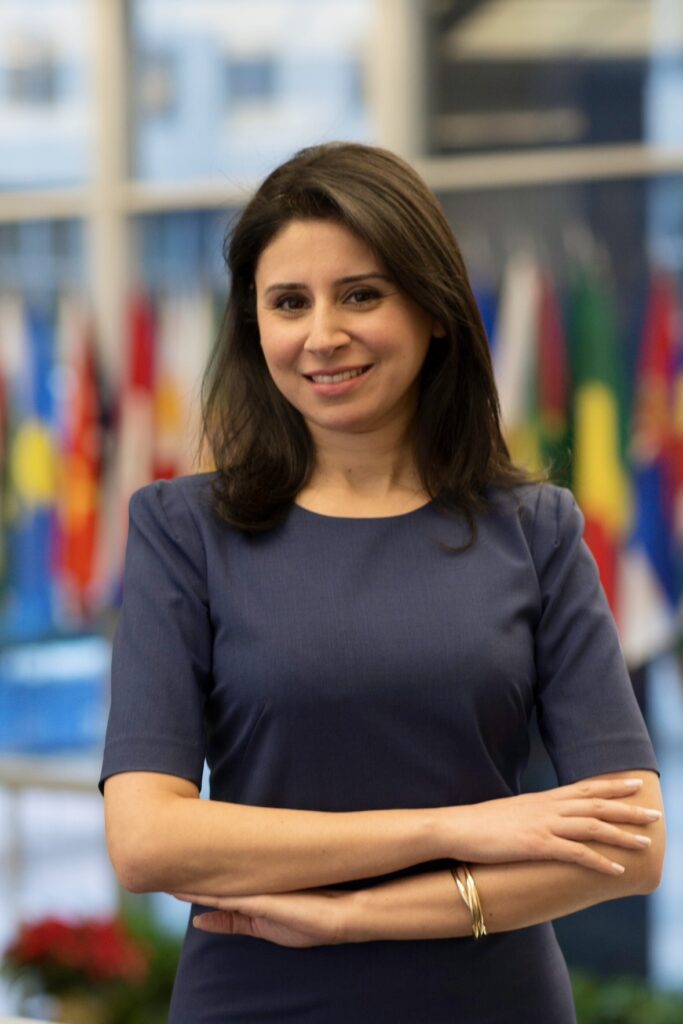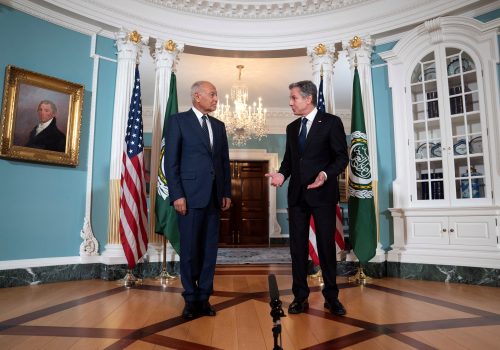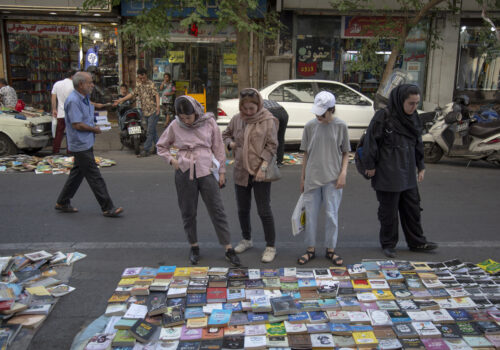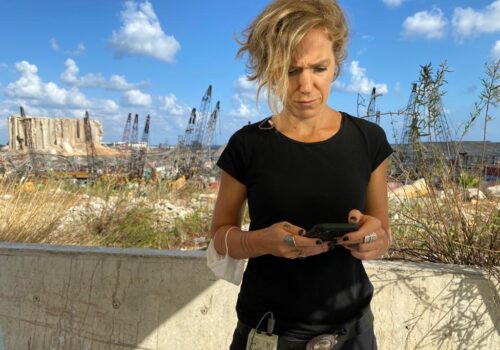Negah Angha: It’s crucial to understand and listen to diverse MENA voices
Negah Angha is an Iranian-American foreign policy and national security expert with nearly two decades of experience in the US government. In her seventeen years at the State Department, she developed US law enforcement and counterterrorism policies, represented the US in negotiations at the United Nations Security Council, engaged with the Afghan government on political-military issues, and coordinated and managed foreign assistance programs for Afghanistan, Pakistan, and in the Middle East and North Africa region. While working at the White House National Security Council (NSC), she led the Joe Biden administration’s Summit for Democracy and managed the NSC’s external engagement with global stakeholders on significant policy shifts.
Outside of government, she has worked as an associate vice president at The Cohen Group, a global business consultancy group, and has taught classes at King’s College London and the United Kingdom Defense Academy Joint Services Command and Staff College. She joined the Atlantic Council as a nonresident senior fellow with the Scowcroft Middle East Security Initiative in September 2022 and was also a Spring 2023 resident fellow at Harvard’s Institute of Politics.
Our MENASource editor, Holly Dagres, had the pleasure of sitting down with the senior fellow on August 9 to discuss her views on Middle East policy, social movements, and where the region is heading.
MENASOURCE: What initially drew you to the field of Middle Eastern studies and foreign policy?
NEGAH ANGHA: My interest in the Middle East and North Africa (MENA) region as well as foreign policy was influenced by my personal background. As a child of an Iranian immigrant family in California, Middle Eastern culture was infused in every aspect of our lives, along with all its complexities—including religion and politics, which were common topics at home.
In the 1980s, I remember being sent to a Persian language school on Sunday mornings. At that time, there was also a Persian news broadcast on Public Broadcasting Service (PBS) every morning before school, which was always on in our household. These experiences coincided with historical events in the Middle East, like the Iran-Iraq War (1980-1988). There was a constant sentiment of uncertainty within the Iranian diaspora community, pondering whether we would return or stay abroad… I also spent part of my childhood in the south of France, surrounded by an Iranian diaspora community, and encountered the same sentiments there. This upbringing deeply influenced my interests.
My academic journey began with domestic politics before pivoting to international relations. I initially focused on European foreign policy, but Middle Eastern policy always seemed more compelling and dynamic. It was the finer details that captured my attention. For instance, I took Arabic immersion classes at the University of California, Berkeley, where I learned understanding even the Arabic language required an appreciation of the culture, including the food, humor, and the various dialects. My professional experience at the State Department, which included a focus on Europe, the European Union (EU), NATO, Afghanistan, and the United Nations—before shifting to the Middle East—further fueled my fascination. There’s something about the region—its rich history and the personal connection—that I find incredibly engaging.

MENASOURCE: You’ve lived through a lot of historic events in your government career, including the Arab Spring. Can you unpack what that experience was like while in government?
NEGAH ANGHA: You know, we think about various significant events in history in the context of our own lives and careers and what’s happening at that moment. About a decade ago, the Arab Spring was not only a defining moment in the MENA region but also a pivot in my career. Despite previously focusing on issues outside the Middle East, the Arab Spring drew me deeply into the region’s affairs—starting with multilateral diplomacy at the UN and negotiating resolutions concerning Tunisia, Libya, and then Syria. It was a profound time, witnessing dictators fall and democracy temporarily flourish, with the public’s reactions visible on social media in various languages.
Living through this, especially in regard to Syria, I was in awe initially with the peaceful protests and the burgeoning of hope. Yet it was devastating to watch this optimism turn into a brutal civil war that persists today. The complexity of these multi-layered conflicts, the human costs, and the loss of that initial hope were heart-wrenching.
The foreign policy dynamics during this period were equally transformative, witnessing the enhanced roles of Russia and Iran and the realignment of regional alliances. This period made neighboring countries reevaluate their positions and consider their future actions based on the unfolding events in Syria.
Simultaneously, watching Yemen’s internal conflict escalate into a proxy war between Iran and Saudi Arabia highlighted the vulnerabilities within Gulf states, with missile and drone attacks reaching into unexpected areas. Although I haven’t worked directly on Yemen in the public or private sectors, American friends in Saudi Arabia have shared harrowing experiences of rockets landing in their backyards, starkly illustrating the region’s instability. These sort of lived experiences underscore the real and immediate dangers posed by such conflicts, affecting even the most secure areas in the Gulf States.
MENASOURCE: Uprisings like the Arab Spring and Women, Life, Freedom have been really transformative in the Middle East. How do you interpret their impact in their respective countries and the broader region?
NEGAH ANGHA: With everything in the Middle East, some aspects are heartening while others disheartening. We can comfortably say that the Women, Life, Freedom movement in Iran was truly profound from many different perspectives. Witnessing how this generation of Iranian youth advocates for its rights is incredible. They’re tech-savvy, and technology has played a significant role in the movement, much like it did during the Arab Spring with the role of Twitter (now X). The movement became global, reflecting our interconnected world. Watching these young adults take to the streets to fight for their beliefs—at all costs—has been crucial. It also shattered many misconceptions about diverse socioeconomic groups uniting for change inside Iran and across the diaspora.
Additionally, this movement has caused fractures in how the Iranian regime perceives its influence over society and its control mechanisms. Initially, they responded with a heavier hand to regain control. But more broadly, this has instilled fear across the region, prompting leaders to think, “What does this mean for our populace? What does this mean for our public?” This, I believe, led to a collective step back, a moment to reconsider how to engage with this new generation differently. There was a moment of reflection on what transpired in Iran.
SIGN UP FOR THIS WEEK IN THE MIDEAST NEWSLETTER
In the Middle East and North Africa, history often repeats itself. We saw significant movements, such as the 2009 so-called Persian Spring, when the [post-election protests known as the] Green Movement occurred before the 2011 Arab Spring. These events influenced actions during the Arab Spring. If history repeats itself, we might see another significant movement from this younger generation, inspired by the Women, Life, Freedom movement. It won’t mirror past movements but could lead to a generational uprising. What will spark this? It’s hard to predict, especially with the Middle East’s current unpredictability… We’ll have to wait and see what the future holds for this new, younger generation of people and what they will stand up for.
MENASOURCE: How should countries like the United States respond to such uprisings?
NEGAH ANGHA: Regarding social movements, this complexity persists not only in the Middle East but across various global regions with their unique historical nuances. In the West, like in the United States, it’s crucial for grassroots social movements to occur, but there’s also a need for a power mechanism to drive these movements forward.
Take the Women, Life, Freedom movement; it was a powerful grassroots movement that shattered stereotypes but lacked a “white knight” or galvanizing leader to advance it to the next stage. Similar issues arose in Libya post-Muammar Gaddafi. A decade later, Libya struggles without a unified, functional national government, making daily life precarious for its citizens.
This brings us to whether foreign governments should collaborate with grassroots groups that rise to prominence, which is highly specific to each case. However, the broader issue, especially for national security and international relations, involves ensuring that a caretaker government can stabilize these transitions.
Iran’s geographical significance cannot be overstated. It borders countries like Afghanistan and Pakistan and is close to geopolitical hot zones. If any grassroot movement is successful, it’s critical to establish a caretaker government to prevent the country lending itself to a geopolitical grey area.
Each country’s situation demands a tailored approach to governance post-movement. There is no one-size-fits-all solution. However, it’s generally true that successful grassroots movements require some form of interim governance to guide them to fruition. The global community cannot afford to overlook the necessity of such transitional governance frameworks in these volatile situations.
MENASOURCE: Where do you see the region going?
NEGAH ANGHA: The future of the MENA region will undoubtedly be shaped by a variety of factors, including the outcomes of the current conflicts, the pace of political reforms, and the global economic landscape. It’s a precarious time, and both regional and global actors are reassessing their strategies in the Middle East. There’s an evolution in forms of governance and diplomacy.
Economic and policy diversification is a significant trend. For at least the past two decades, Gulf countries have been actively diversifying their economies beyond oil dependency. This strategic shift is crucial as they navigate turbulent economic conditions, including potential trade wars that could escalate, particularly with uncertainties like the US presidential election in November. If President Donald Trump is reelected, for example, tensions between the US and China could intensify further. Gulf and North African leaders are recalibrating their strategies in response to this shifting global landscape.
It’s fascinating to observe how Gulf countries, such as Saudi Arabia and the United Arab Emirates (UAE), are assuming roles like mediating prisoner exchanges between Russia and Ukraine—roles we would not have envisioned them playing. This signifies the shift in the geopolitical landscape, where these countries can’t definitively choose between major powers like China and the US. They’re navigating a careful path, leveraging their strategic relationships, including with Russia in the oil market management.
And then, of course, we’re seeing the influence of the youth bulge and technology. How this tech-savvy generation acts—particularly in light of movements like the Arab Spring and the Women, Life, Freedom movement—can reshape societal norms. This is a game changer that comes from many socioeconomic backgrounds. Climate change and water security are also pivotal issues.
The role of the United States is under close watch, with the world speculating whether the next leader will be Kamala Harris or Donald Trump. What is Joe Biden going to do in the last few months of his administration? How the US navigates these months will be critical. The US has been trying to maintain an offshore balancing approach, which has been beneficial. Regional alliances like the I2U2 Group (India, Israel, the United Arab Emirates, and the United States) help recalibrate the region’s reliance on other global superpowers.
It’s essential not to lose sight of these broader geopolitical dynamics amid the immediate crises and conflicts. Observing the interactions between the Gulf states and new partners like China, who are critical players influencing regional operations, is crucial. Each country is assessing its engagement based on short-term and long-term returns, shaping their strategic decisions significantly.
MENASOURCE: As you mentioned, there’s a US presidential election in November. What advice would you offer the incoming administration regarding the Middle East?
NEGAH ANGHA: Again, it’s so complex. All the foreign diplomats we interact with are trying to predict the outcome of the US presidential election. They’re analyzing speeches and rhetoric, both domestic and international, to send detailed reporting cables back to their home countries.
No matter who wins the presidency in November, it’s crucial for the United States to focus on long-term gains rather than short-term fixes. Unfortunately, short-term thinking has undermined our relationships with the Middle East and North Africa, leading to policies that may not always align with the needs of those in the region. It’s essential that we support sustainable development assistance projects in education or healthcare improvements, which are critical to the populations there.
We need to maintain a strategic focus despite budgetary constraints and political changes. The US is known for its ability to provide substantial assistance, and continuing this is vital. In terms of diplomatic engagement, we must promote a dialogue-based approach towards resolving conflict.
You know, we’ve seen China trying to play in that game. China’s involvement, for example, has been inconsistent. They made a significant impact with Iran and Saudi rapprochement and then receded from active engagement, which is similar to their actions regarding the Red Sea conflict for example.
It’s crucial that any US administration maintains a consistent and engaged approach to foreign policy in the Middle East. Each administration may have different methods, but the importance of sustained diplomatic engagement cannot be overlooked.

MENASOURCE: On the continued topic of the Middle East, can you share a lesson you’ve learned through your career?
NEGAH ANGHA: If I were to distill my view into one simple reflection, it would be that the Middle East is an incredibly complex region filled with equally complex people. For anyone aiming to succeed there—whether as an academic, diplomat, or journalist—it’s crucial to listen and understand the diverse voices and stories within the region. This understanding enriches your perspective and enhances your appreciation of the dynamics at play and the reasons behind them. It also emphasizes the importance of engaging with people from different backgrounds across the Middle East.
One of the critical oversights we often have here in Washington is that we get trapped in a bubble, hearing the same stories from the same very “elite” circles. However, we miss out on engaging with other significant parts of the population. Take Morocco, for example. We often overlook interactions with the Berber community—a vital part of the country’s heritage—focusing instead on the French-speaking elites in urban centers like Rabat or Casablanca.
I think that’s why someone like Lila Abu-Lughod, who I greatly admire, was so pivotal in shifting academic perspectives by emphasizing that Muslim women are not the suffering souls found in earlier scholarship, challenging us to engage with and understand their true identities rather than labeling them as simplistic.
These nuances are sometimes lost in the bubble we find ourselves in here in Washington.
Further reading
Tue, Aug 8, 2023
Could a regional bloc work in the MENA or is it a fool’s errand?
MENASource By Negah Angha
Addressing the regional conundrum requires transcending the traditional boundaries of geopolitical competition.
Thu, Aug 8, 2024
Summer isn’t over. Here’s our recommended reading list.
MENASource By William F. Wechsler, Sarah Zaaimi, Emilia Pierce, Masoud Mostajabi, Manal Fatima, David Maloney
Our team has you covered with their recommended reads related to the Middle East and North Africa for the dog days of summer.
Fri, Mar 8, 2024
Journalist Arwa Damon on conflict reporting: ‘You will leave a part of yourself behind’
MENASource By Holly Dagres
The multi-award-winning journalist was interviewed by our MENASource editor to discuss her recent projects, mental health in journalism, and the importance of effective storytelling.
Image: Photo of Negah Angha (Photo by Martha Stewart)


